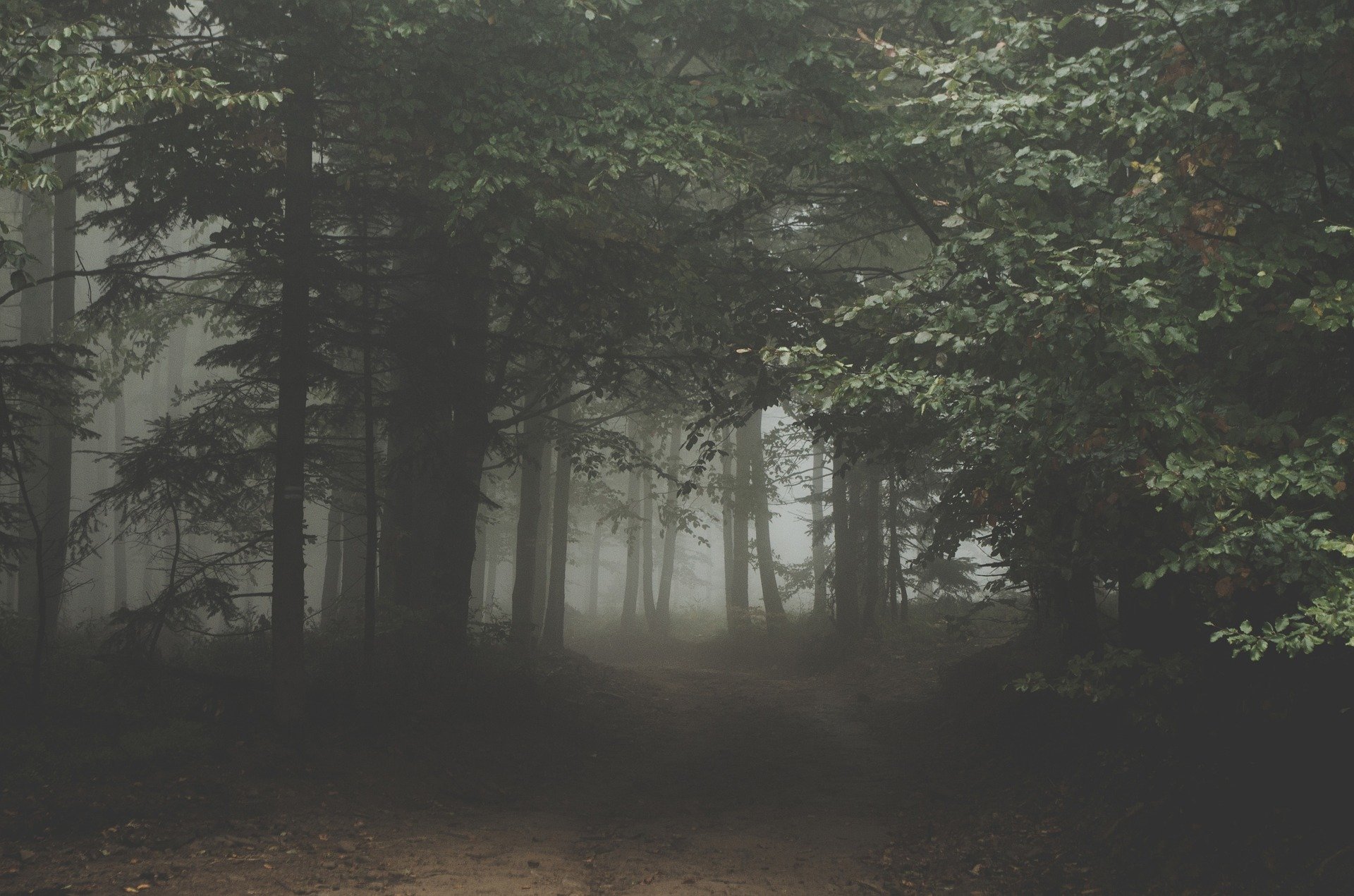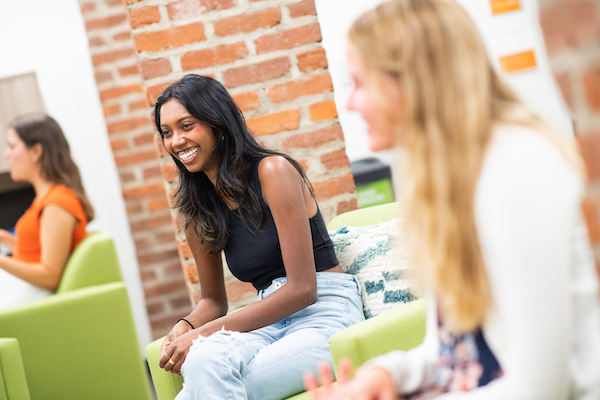
It’s not a secret that the Women’s Center embraces an ethos of trauma stewardship. In the past weeks, I have found myself turning to the epigraph from one of the field’s foundational texts: You can only go halfway into the darkest forest; then you're coming out the other side.

As we turn another page of the calendar and case numbers of COVID-19 continue rising, it’s unsurprising that we also wonder when we will transition from this liminal space to a post-pandemic new normal. I don’t pretend to know how far into the forest we’ve gone so far. I don’t think we ever can know the halfway mark except in retrospect.
Among the many ways our abrupt shift to online learning changed my course this spring, the final stands out as one aspect that did not change. As I’ve shared with countless numbers of students and classes, there is an ideal exam in my mind when I create any final exam. This is not some hypothetical exam. It is an exam I took in spring 1995. The course was Victorian Literature, the professor a woman I wanted to be when I grew up (and who taught me to want to be, instead, myself). The exam would be open-book, and I had reread everything several times (how was one meant to prepare for an open-book literature exam?). I went in with my copy of the course anthology, the key selections marked with paperclips, each author assigned a different color. I was ready to answer questions, pull out the perfect quote, turn in the blue book, and head off for the summer.
And if that is how the exam had gone, I wouldn’t still remember it now, twenty-five years later. I wouldn’t aim to recreate that experience for my own students. I anticipated a question here about John Stuart Mill, there about Elizabeth Barrett Browning, maybe something about William Morris’ textiles for variety—but I found an all-together different experience in the five questions Dr. Lonnquist laid out for us. I couldn’t just cherry-pick some quotes and regurgitate the class notes for a series of readings. Answering these questions demanded that I sit with the authors, their writings, what I knew about the historical and social context of their composition – and then that I draw conclusions about what we call “Victorian literature.” I went into the exam knowing some poems and essays. I walked out understanding an era.
The exam, thus, really matters to me. And this year, even more so than ever before.
It is this very experience of pausing and figuring out for yourself just how much you’ve learned and now know about a field, what the scope of that field is and why it matters to you, that I aspire to recreate for my students. I don’t need them to tell me what the pieces are (and so I almost always give open-book exams). I want them to see how the pieces fit together and explain that.
In my courses, the exam is the cumulative, concluding learning experience. It is the map out of the forest. The exam, thus, really matters to me. And this year, even more so than ever before.
Fun fact: much of my work this spring (including writing this!) was done to the soundtrack of Aaron Copland’s “Appalachian Spring.” First, I heard the Toronto Symphony Orchestra’s socially distanced version. YouTube quickly decided, based on my daily listening, that I should listen to Leonard Slatkin conducting the Detroit Symphony Orchestra playing the full suite. These notes wove their way in and out of my attention throughout my weekend marathon to read and grade my students’ finals.
At 1:00 pm on May 16th, I sat at my dining room table to watch the University’s Virtual Celebration and Degree Conferral. My heart cracked a bit when I heard Yo-Yo Ma play the opening notes of “Simple Gifts,” with its echoes of Copland’s composition, and I watched a lone student walk across Grounds and down Rugby Road. I am sentimental and tears well easily in my eyes, so it was no surprise to me that the year in review video touched me from the opening frame. I was unprepared, though, for the way my heart broke wide open at the pivot:

When I said goodbye to my students before spring break, I sent them off with the same phrase I’ve sent every other spring cohort off with: “Have fun! Be safe. Have fun!” If we were looking ahead to the second half of the semester, some of us were probably wondering what it would be like in our classroom (on the 2nd floor of Mem Gym with windows that do not open) when the warmth of Virginia spring arrived, given how hot we already were. Some might have been thinking about the budget project scheduled for the second half of the semester. Most were likely focused on the upcoming break from routine. None of us had an inkling that we would never again be in 211 Mem Gym together.
Our Zoom world prompted me to try something new this year: during the scheduled exam period, I held an open zoom call for virtual office hours so that students could check in with me if they had any last-minute questions. I wasn’t sure if anyone would take me up on the offer, so I was pleasantly surprised when two students hopped on the call, each for a few minutes. When I hand out my exam questions, I always tell my students, with absolutely zero irony or sarcasm, “I hope you enjoy this!” I usually get some feedback in the form of a quick note in the email the exam is attached to, but this was my first opportunity in many years to observe students in the process of composing their final interactions with the course content.
One of the students who hopped on the call wanted to continue an exchange we’d been holding over email in the days leading up to the exam. She’d been asking deep philosophical questions: "how do I answer this question without stereotyping mothers from particular groups?" On the call, she explained how she'd grappled with my responses and the direction her answer has developed. Some might interpret that as her asking, “is my answer ok? Am I correct?” – but such a view would be completely wrong. This was, instead, a final intellectual exchange, the very kind of growth that comes from a sustained exchange of ideas that is the point of a university education. In a semester marked by crisis and hardship, I was fortunate to both participate in and witness the leaps in understanding that she was making as she drafted answers to the questions I’d posed.
And then I spent days in my recliner, reading exam after exam, and the only hard part was reading so much on my laptop screen as I came to appreciate anew the potential power of the final exam: navigating the forest, I realized, is a bit like sitting for a well-crafted exam. The depth of their learning became evident, student after student, answer after answer. What had seemed unthinkable in March had come to fruition: we completed the course in a way that both honored their new reality and facilitated the satisfying sense of conclusion and new understandings that I had aspired to on their behalves when I wrote the syllabus last fall (and dared to dream we could still fulfill when I revised it in March).

So, we may have watched the world stop in March. But as the year in review video continues, we embrace change. We rise above.
For the first half of the semester, this winter’s rough flu season had me reinforcing my class’s most important rule on a daily basis: do not come to class if you are sick. Stay home and take care of yourself instead. One of our goals at the Women’s Center is to help students develop professional identities. So, I would tell my students, “I don’t need an elaborate explanation. Just the courtesy of an email letting me know you’re out sick (because you don’t just fail to show up for work).” I’d joked in those weeks that perhaps the most important thing they would learn from me was not to go out in public while sick (who knew just how important that would become???).
By the end of the semester, though, I hope they learned a few other, interrelated and equally important lessons: To be kind to themselves. To persevere – and maybe even find value in the experience. Struggling through a surmountable challenge is a learning opportunity. Walking away from an insurmountable challenge is a legitimate choice. Discerning the difference between the two is another challenge in itself. Just how many and heavy are the expectations and demands our society places on mothers (the class was The Politics of Motherhood, after all!).
These past four months have been marked by multiple signposts of pain and crisis (coronavirus, death, racism, economic precarity, fear), and we are still wandering among trees that block out the light. Our ability to know when we have passed the halfway mark must wait for the kind of reflection that comes only with the distance to see all of the elements of a particular moment’s context and how they interplay with each other. We can only define the halfway point in comparison. This reality can alarm us – or it can liberate us from obsessing about distance to allow us to focus on the light we’re walking toward. And so, the final lessons I offer: How hard it is to navigate the forest from its deepest center – but how much they carry with themselves to equip them for this journey.

